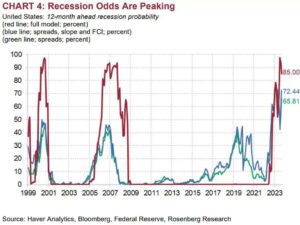Economist David Rosenberg asserts that the United States faces an 85% likelihood of recession in 2024, marking the highest probability since the Great Financial Crisis. This prediction is derived from a new economic model, dubbed the “Full Model,” which Rosenberg emphasizes. According to this model, there is an 85% chance of a recession occurring within the next year, representing its most pessimistic outlook since 2008.
The “Full Model” draws from various economic indicators, including financial conditions indexes, the debt service ratio, foreign term spreads, and the level of the yield curve. Developed from a working NBER paper, Rosenberg believes this model offers a superior predictive ability compared to others, boasting a track record of accurately signaling recessions since 1999, without generating false alarms.
Rosenberg’s model contrasts with the yield-curve indicator, which, in early 2023, suggested a mere 12% chance of recession, while the model projected significantly higher odds. This underscores the model’s distinctive predictive power and its potential significance for assessing the economic landscape moving forward.

Rosenberg highlighted that the full model accurately anticipated the ‘soft landing’ observed in 2023, but it now signals significantly elevated recession probabilities for 2024. This challenges the prevailing notion of an impending “soft” or “no landing” scenario for the economy this year.
Rosenberg emphasized that despite hopes of delaying recession, the conviction that it will eventually occur remains strong. Should a recession materialize, Rosenberg warned of potentially dire consequences for the stock market, noting that few asset classes are currently priced to withstand such an outcome.
The model also sheds light on why the widely tracked yield curve indicator has failed to accurately predict a recession thus far. According to Rosenberg, favorable financial conditions, low debt service obligations, and positive foreign term spreads have offset the signals from the inverted U.S. yield curve, rendering it less effective as a recession predictor during the 2017-2019 period.





